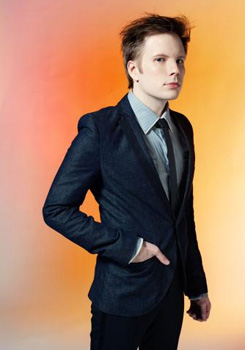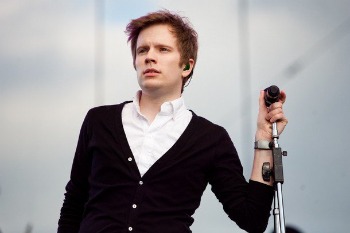INTERVIEW: Patrick Stump, Part II
By Lizz Kannenberg in Arts & Entertainment on Jan 4, 2011 5:00PM
 We continue our chat with Patrick Stump. You can get up to speed with the first half of our interview if you haven't already read it.
We continue our chat with Patrick Stump. You can get up to speed with the first half of our interview if you haven't already read it.
Chicagoist: It was kind of an interesting move to put out two different arrangements of the same song, because people are talking about which arrangement they like better and not about the song itself as it relates to Patrick Stump from Fall Out Boy.
Patrick Stump: Goddamn, I wish I’d planned that! I didn’t but it’s been really nice because I haven’t had that many personal attacks, it’s just been the song - people are personifying the song, but it was honestly not intentional…it’s a way to explain something about and to understand my audience. To break down that fourth wall of “I’m the artist, you’re the audience.” Shit, I fully intend to do whatever they vote for. Even if I disagree with it, I’m still going to do it.
C: I think it’s going to be close.
PS: Well it’s interesting too, as time goes on. Watching the trends in the vote, I’ve had so many people tell me they’ve changed their minds on it too. It’s been way more fun and inspiring on a creative level to have that exchange with my audience, or people whose opinions I respect, than it would be to just go do radio interviews.
C: It must be sort of cool to have that platform, just because you have a basis of people who are interested in what you’re doing.
PS: That’s something that I don’t ever want to play down - I understand that I’m lucky to have that, and that’s another reason why I definitely intend to listen to people. It’s not necessarily just, “Give ‘em what they want” because at the end of the day, I created both of those songs and it’s all stuff that I’m happy with, but I don’t like when artists are just challenging their audiences in an aggressive way. I want to challenge people intellectually, but I want it to be in subversive ways so you might not notice it the first pass through. If you don’t like a song the first time through, then it’s not a good song.
C: I think you challenged yourself by doing the two versions of the song in the first place.
PS: Well, I think another thing was that the great chasm of time I had to make the record left a lot of space for over thinking, and I didn’t want to over think it to death and take the art out of it. And when I say “art,” I understand that I’m not Warhol. I understand that I’m not Picasso. We’re talking about a little pop record, but I still take it seriously and sometimes there are really knee-jerk things about creating any medium and you should kind of stop thinking and let it out there.
C: I don’t know if you listen to Sound Opinions on NPR at all - did you hear the James Murphy interview at all this week?
PS: No, I would have wanted to. I’ve been trying to keep up with NPR, but whenever I’m in Los Angeles I can’t find NPR so I miss a lot of things.
C: Grab this one in a podcast if you can - it was one of the best I’ve heard. He was talking about how before he got into music he was 22 or so and narrowly missed an opportunity to write for Seinfeld, but it was a good thing that he didn’t get the job because having a bunch of people tell him he was great at 22 would have turned him into an egocentric, miserable fuck. As someone who wasn’t successful until later in life, he was saying that it was a good thing that he wasn’t successful when he was young. So I know you’re not a miserable fuck, but you were successful early on. Can you talk about how that affected your development as a young adult and as an artist?
PS: I’ve thought about a lot. A) That’s an awesome interview, and b) It’s definitely weird because my most awkward years were videotaped. My most awkward years were broadcast. If you look up my name on Google, the first two pages of images are me at my most awkward, ugly duckling stage. So that’s a weird feeling and a weird thing to know that you don’t have that privacy of anonymity, and I think that in a lot of ways it kind of forced me to be a little bit honest. A lot of artists would love to be Lady Gaga and create the character, but I know that I don’t get to do that. It’s like T.S. Eliot said, something along the lines of “The mind is never as taxed as when limitations are placed on it.” I have to find a way to do something that I would want to see, but by being me. I’m not a traditionally confident guy, so I have to have a lot of conviction in the art or music that I’m doing. I definitely envy anonymity and having that blank slate of having a first impression - I don’t get a first impression as a debut artist, I don’t. I am very happy with the legacy that my band had, but what what I’m doing - I don’t think it’s related to it. So if anything, I have to do something musically to get people’s attention away from it.
 C: I think it will always be there, in a sense.
C: I think it will always be there, in a sense.
PS: Yeah, but I’ve been looking at a lot of music history, of people who have gotten away from their bands without slagging them. There’s no ill will towards the band or the guys or anything, it’s just not where my head’s at or where my music’s at right now. I’m not trying to prove to anyone that I’m not “emo” or anything, I just don’t really happen to think that I ever was…I guess what I’m trying to say is that that kind of pressure - of successful youth - is pushing out a lot of substance in what I do now.
C: Well, and your audience has grown up too.
PS: Definitely, and that’s another thing - I don’t want to play to expectations. Something that was really interesting to me was that Fall Out Boy did a tour with Blink 182 and everyone I talked to in the music industry assumed automatically that that would be the perfect bill, that those audiences would totally enjoy both bands. And it was absolutely disparate. Blink 182 and us got along great, but those were not the same audiences. It pointed out to me how foolhardy a lot of those assumptions can be.
C: I think a lot of assumptions are made about audiences, and that at times too many people stop thinking about the audience.
PS: Well you should stop thinking about the audience in a lot of ways. I was watching Jay-Z on Charlie Rose the other day, and [Rose] was asking Jay-Z why he thinks he’s successful. He said, “Because I don't write songs that I think people will like, I write songs that I like.” But I’ve seen a lot of artists consider the math of like, ‘I think people would like a song about girls, or about cars, or about these popular shoes.’ Whereas he just writes songs that he wants to hear and presents them to the audience and trusts them. That’s the thing - people are a lot smarter than a lot of artists give them credit for or that the music industry gives them credit for.
C: You bring up a point about writing songs about certain subjects - I’m not entirely sure what your lyrical contributions were at the end of Fall Out Boy -
PS: Pretty much all three major label records, I didn’t write a word. I’m very into the sound of things and I do write constantly, which is another driving force behind this new record. I’ve been writing lyrics for 10 years with no outlet, which has been really frustrating. And that just wasn’t how our band worked, so it wasn’t something that I wanted to force in there.
C: Now you’re not only writing lyrics but people are hearing them. Does that feel different for you?
PS: That’s one of the most surprising things about being a burgeoning solo artist - I didn’t expect there to be any surprises! Fall Out Boy had a good little run there, and I’m sure if there was ever a Time Life “Best of the early 2000s” infomercial at two in the morning…we are to the 2000s what REO Speedwagon was to the ‘70s, you know what I mean? I kind of thought I’d seen it all, so I felt this very earnest joy when people complimented my lyrics, which I never expected. I mean, I expected people to slam them, but when people connect with them…it was a different feeling I’d never had before.
C: It’s a different thing to get out of music, maybe.
PS: Yeah, everyone would always ask me, “What does it feel like to have people singing your songs back at you?” when I was in Fall Out Boy, but I was just paying attention to making sure I was in tune and making all the cues. It was very fun, but you’re focusing on a lot of the mechanics of it. But I feel like with this [solo work], I may actually stop and notice that feeling.
C: If you need the old feeling, you can always go back to the Fireside Bowl and try to look inconspicuous.
PS: I’m still very inconspicuous. Even at the height of the band, I didn’t really get stopped that much. I don’t think people expect me to be as short as I am, and I’m not the most recognizable face. Even if you know who Fall Out Boy is, and you know who I am, a lot of people still don’t recognize me.
C: A blessing and a curse?
PS: I think it’s always a blessing, personally. The only time it really hurt me was that SXSW show this year when I went out and no one knew I was playing yet. They thought I was the tech.